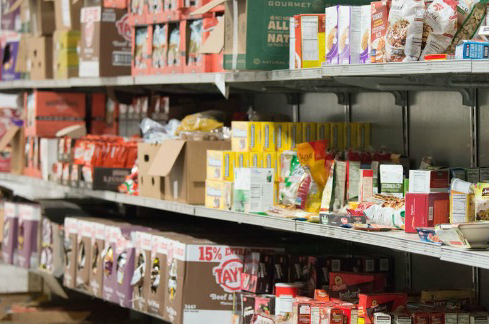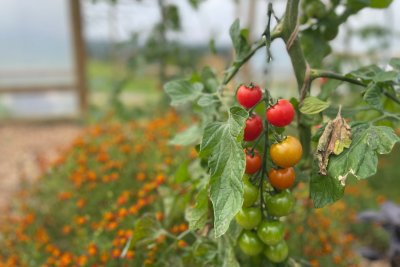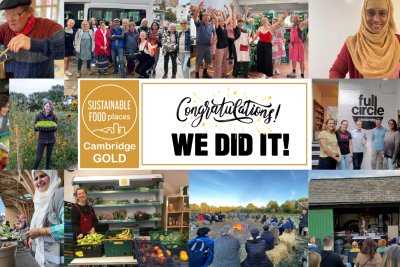Independent food banks in Scotland report doubling in need for emergency food parcels
Scotland’s independent food banks report at least doubling in need for emergency food parcels compared to last year’s April to July figures.

Figures from the Independent Food Aid Network, a member of Sustain, show:
- 108% rise in the number of emergency food parcels distributed in July 2020 compared to same month last year
- 70 independent food banks across 20 local authorities in Scotland distributed at least 182,863 emergency food parcels between February and July 2020
Despite the Scottish Government’s ‘cash first’ approach, independent food banks in Scotland have seen the need for their services double since the start of lockdown.
As the furlough scheme is set to end, deep recession takes hold and local lockdowns begin to be implemented, the Independent Food Aid Network (IFAN) is calling on the Scottish and UK Governments to do all they can to address the escalating poverty driving increased food bank use.
Action is needed at every level of government to significantly reduce the need for charitable food aid provision. IFAN is calling on the UK Government to:
- make the £20 uplift to Universal Credit permanent and extend it to legacy benefits;
- remove the benefit cap;
- end the 5-week long wait for a first Universal Credit payment by removing the loan element of advance payments;
- end the two-child limit;
- end the sanctions system;
- permanently suspend No Recourse to Public Funds status.
IFAN is calling on the Scottish Government to deliver on its commitments to a ‘cash first’ approach and:
- clearly promote the Scottish Welfare Fund throughout Scotland to ensure people on low incomes experiencing crisis can access cash to cover urgent living costs;
- take immediate action to help families on low incomes by putting in place the equivalent financial support of the Scottish Child Payment due in February 2021.
Local authorities in Scotland can also help by improving promotion of and accessibility to Scottish Welfare Fund crisis grants as a first port of call for someone facing a financial crisis.
Mary McGinley of Helensburgh and Lomond Foodbank said:
“These figures again show that an ever-increasing number of people in Scotland continue to live in poverty experiencing food insecurity. Despite the Scottish Government increasing the budget for Scottish Welfare crisis grants, too many people still had to turn to food banks to feed themselves and their families. Going forward, more needs to be done to address the underlying cause of food insecurity and poverty in our communities. We are all aware that food prices in some areas have significantly risen, those on low pay, on zero-hour contracts with insecure employment or relying on benefits do not have enough income to spend more on food. This is particularly an issue for those living in rural and island communities and areas where there are no low budget grocery stores and food prices are high. As unemployment continues to rise and more people are finding themselves relying on benefits, it is time that benefit payments were increased to bring them into line with the true cost of living."
Joyce Leggate, Chair of Kirkcaldy Foodbank said:
“In Kirkcaldy, as in many other areas, we experienced a big increase in demand in April which lasted about 3 months. The overall demand has reduced slightly but we are still seeing higher than pre-Covid levels of need for support from families. Many of these families have found themselves relying on the benefit system for the first time in their lives which adds to their distress when attending a food bank. Households must be able to rely on a benefits system that is fit for purpose that enables them to feed their families rather than having to turn to food banks run by voluntary organisations.”
Evan Adamson of Instant Neighbour in Aberdeen said:
“As we approach the end of furlough and are seemingly being encouraged to 'get back to normal' it is important to apply the brakes. We are still in unchartered territory in our food bank with request levels, and as we see more people fall into unemployment and insecurity this is likely to rise again before it gets any better. The amount of people who come to see me as they have no idea how to access information is astounding, and I spend large amounts of my day giving basic information regarding benefits, food insecurity and general Covid-19 updates. General information does not seem to be filtering down to local levels, and this will only become more important as we move towards the end of 2020.”
Sabine Goodwin, Coordinator of the Independent Food Aid Network said:
“Independent food banks in Scotland have seen a doubling in need for their support. The writing is on the wall. Even more people are going to be thrown into financial crisis in the coming months, and food banks cannot continue to pick up the pieces of a broken benefit system and insufficient wages. The Scottish and UK Governments as well as local authorities must do all they can to prioritise access to ‘cash first’ solutions for people unable to afford food.”
Chelsea Marshall, Senior Project Officer at the Independent Food Aid Network said:
"Food banks have been working throughout the pandemic to support people who are unable to afford the food that they need. The people represented in this report include those who were already struggling on low wages and insufficient benefits and many more who have suddenly lost income and are now unable to meet the cost of living. We welcome the Scottish Government's commitment to a ‘cash first’ approach to food insecurity, but food banks are today calling for practical action to make sure people don’t keep falling through cracks of the social security system.”
More about the Independent Food Aid Network and their work in Scotland:
- The UK-wide Independent Food Aid Network (IFAN) connects, supports and advocates on behalf of a range of over 340 frontline food aid organisations including nearly 400 independent food banks. IFAN has identified at least 916 independent food banks operating across the UK.
- IFAN envisions a society without the need for charitable food aid. IFAN member organisations recently wrote to the Prime Minister calling for change. Here’s their letter.
- Since the onset of the COVID-19 crisis, independent food banks across the UK have seen a large increase in need for emergency food parcels. IFAN has been collecting data since the Autumn of 2018 from independent food banks operating in Scotland in order to monitor and collectively report on food parcel distribution outside of the Trussell Trust network.
- IFAN’s latest report reveals that after a sharp increase in need for emergency food parcels during April and May, independent food banks have continued to distribute more than twice as many parcels in June and July than during the same months in 2019.
- Dr Chelsea Marshall, currently on secondment from Nourish Scotland, is leading IFAN’s Cash First Project in local authorities across Scotland.
For further information please contact Sabine Goodwin at sabinegoodwin@gmail.com
Published Tuesday 8 September 2020
Food Poverty: Millions of people in the UK struggle to get enough to eat. We’re working to change that through people-powered projects and campaigns that tackle the root causes of food poverty and ensure everyone has dignified access to healthy, affordable food.





